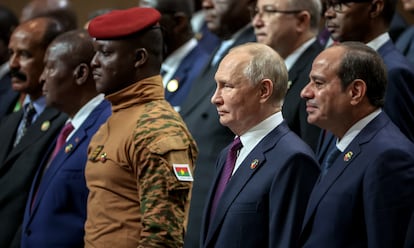Russia expands into the Sahel with its new brand: Africa Corps
After consolidating in Mali, Moscow is strengthening its collaboration with Burkina Faso and Niger through an armed structure intended to replace the Wagner Group

Russia is expanding its influence and military presence in the Sahel at an unprecedented pace. After consolidating itself in Mali — where Wagner Group mercenaries were decisive in the national army’s reconquest of Kidal against the Tuareg rebels last November — Moscow is now laying the foundations for its deployment in Burkina Faso and negotiating with Niger to become a key military ally. To this end, the Russian government has created a new military structure called Africa Corps, which works under the Defense Ministry. In this way, it intends to replace the Wagner Group and move away from a decentralized private company to one that is more directly controlled by the state. In parallel, at the beginning of December, the U.N. made official its complete withdrawal from Mali after handing over the Mopti base to the Malian authorities.
On November 14, after violent fighting against the Tuareg rebels, the Malian army triumphantly entered the city of Kidal, a separatist fiefdom that authorities had not controlled for more than a decade. However, the Malian soldiers were not alone: some 600 Wagner mercenaries were part of the enormous convoy that left Gao for the mission. In several videos shared on social media, the mercenaries could be seen aboard armored vehicles circulating through the city after it fell to the army. Days later, a flag with the Wagner logo flew over the Kidal fort until it was removed by Malian authorities, who prefer to maintain a patriotic discourse that attributes the success of the operation to the own armed forces.
“Would the Malian army have been able to reconquer the Kidal region on its own? Who knows. What there is no doubt of is that Russian participation has helped and that the armed forces of the Sahel, as is the case in Mali, today have better equipment,” says Amid Bencherif, a researcher specializing in the Sahel. The presence of Wagner’s mercenaries on Malian soil has been reported since at least December 2021, as well as their participation in numerous anti-terrorist operations, especially in the center of the country. Russian weapons have been flowing into Mali since then, and Colonel Assimi Goita, the leader of the Malian military junta, received a lot of attention from Russian President Vladimir Putin during the Russia-Africa summit held last July.
However, the death of Wagner Group chief Yevgeny Prigozhin, after he rebelled against the Russian president, has changed the way Russia provides military support to its African allies. On November 22, a recruitment ad for a body called Africa Corps appeared on Telegram. Africa Corps presents itself as Russia’s new armed wing on the continent, and is directly linked to the Ministry of Defense. According to the All Eyes on Wagner association, specialized in the activities of this company, “Africa Corps would be a convenient cover for the operational personnel of the Russian Ministry of Defense, as well as its security services, having much more limited autonomy than the Wagner group and lacking a strong figure [like Prigozhin].”
Burkina Faso and Niger
Burkina Faso is also moving closer to Russia. On November 10, a Russian army plane landed at Ouagadougou airport. About 20 uniformed officers got off the plane and settled in a luxurious hotel in the capital, according to different sources. After a year of rumors, Russian soldiers were openly seen in a chemical factory and allowed themselves to be photographed in a laboratory that makes drugs to treat viral hemorrhagic fevers in Bobo-Dioulasso, the country’s second-largest city. Days before, Burkina Faso public television broadcast a report on the fight against jihadism in the north-central region in which an army captain appeared sporting two large Wagner logos sewn onto his uniform, according to All Eyes on Wagner.
Although Captain Ibrahim Traoré, the strong man of the Burkinabè military junta, has chosen to reinforce the country’s own resources in the anti-jihadist fight —carrying out intense, sometimes forced recruitment for both the armed forces and the controversial Volunteers for the Defense of the Fatherland (VDP) — he has also recognized on numerous occasions the need to have international support, especially in terms of war material. Like Goïita, Traoré had several conversations with Vladimir Putin at the St. Petersburg summit and later by telephone, and Russian and Burkinabè military delegations met on multiple occasions in the last year.
In Niger, where a military junta has also ruled since last summer, the new authorities denounced last Monday the defense agreements that linked it to the European Union. That same day, Russian Deputy Defense Minister Yunus-bek Yevkurov met in Niamey with General Abdourahmane Tchiani, the president of Niger and General Salifou Mody, the minister of defense. The meetings aimed to “strengthen cooperation between the two countries in the field of defense,” according to a statement from the Nigerien government. “It is evident that there is a strategy [by Russia] to extend its influence,” says Bencherif, adding that Russia is also seeking to curb Western influence.
This Russian expansion is occurring after the authorities of Mali, Burkina Faso and Niger expelled French soldiers from their respective territories and created the Alliance of Sahel States, an organization of mutual aid and military cooperation that was born after the rest of the countries in the region threatened military intervention against Niger. The three states also collaborate in economic and commercial matters to counteract the sanctions from the Economic Community of West African States (ECOWAS). The U.N. mission in Mali has also been forced to pack its bags at the request of the military junta.
Meanwhile, jihadism — which has been affecting the region for more than a decade and is carried out by the local arms of Al-Qaeda and the Islamic State — remains very active. At the end of November, a jihadist attack in the city of Djibo, in northern Burkina Faso, killed at least 22 people, and there have been several more in Malian cities such as Ménaka. Last week, Burkina Faso and Niger announced their withdrawal from the West-supported G5 Anti-Jihadist Alliance, paving the way for its dissolution.
Sign up for our weekly newsletter to get more English-language news coverage from EL PAÍS USA Edition
Tu suscripción se está usando en otro dispositivo
¿Quieres añadir otro usuario a tu suscripción?
Si continúas leyendo en este dispositivo, no se podrá leer en el otro.
FlechaTu suscripción se está usando en otro dispositivo y solo puedes acceder a EL PAÍS desde un dispositivo a la vez.
Si quieres compartir tu cuenta, cambia tu suscripción a la modalidad Premium, así podrás añadir otro usuario. Cada uno accederá con su propia cuenta de email, lo que os permitirá personalizar vuestra experiencia en EL PAÍS.
¿Tienes una suscripción de empresa? Accede aquí para contratar más cuentas.
En el caso de no saber quién está usando tu cuenta, te recomendamos cambiar tu contraseña aquí.
Si decides continuar compartiendo tu cuenta, este mensaje se mostrará en tu dispositivo y en el de la otra persona que está usando tu cuenta de forma indefinida, afectando a tu experiencia de lectura. Puedes consultar aquí los términos y condiciones de la suscripción digital.









































